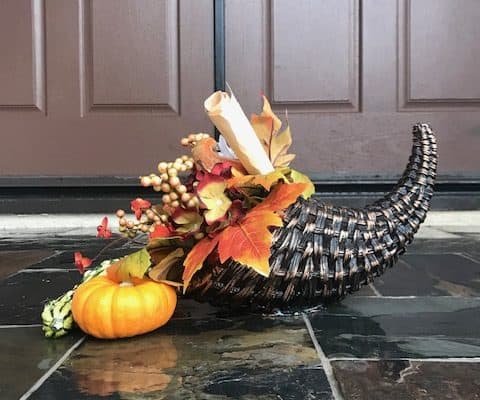When A Demon Comes To Dine

I rush home from school. This may be the night. This is our chance to be a normal family. All the insanity waits beyond the wooden dining room table. Nothing else carries the weight of the dinner ritual. If done correctly, it eases my family into the illusion of a peaceful evening; if not, it brings forth a glimpse of the Apocalypse.
“Where’d the demons come from?” I ask my eldest sister as we gather the clinking plates and tinkling tones of silverware from the kitchen’s wooden bureau. I cannot reach the shelves – on my tiptoes I reach for each dish she passes down from the highest cabinet.
“Mom’s great aunt hated dad and gave them a cursed clock as a wedding gift, a demon clock.” She motions to a horological marvel on the fireplace mantle made of green and ivory mottled porcelain. Cherubs hold up the face adorned with golden Roman numerals, hands ticking their way around its surface. I recall my parents’ futile attempts to rid our family of it. Within a day or two, it always reappears somewhere in the house after a cackling crack of lightning and thunder.
“How did Mom and Dad learn all this before we were born?” I ask.
“I don’t know, “she whispers, “but this passes on to us. Besides, what if it follows one of us when they die? What if they have to give it away?” She pauses, stricken with thought. “What if I that’s why she gave it to us?”
“What does it want?” I plead.
“I don’t want you to find out,” she shudders, hurrying to grab the remaining dishes. “The ritual appeases it for one more night.”
My eldest sister watches for the mistakes in the place setting ritual that could summon forth the demon, and I try my best to emulate her. First, we clear the table and remove all debris with a lightly damp sponge, taking care to leave no trace of water on the carved circle and symbols my father chiseled long before I was born. Then, we lay a thin, lace tablecloth over the table to protect the seal, but keep it visible. To this altar, we carry in the stacks of matching plates, counted numbers of utensils and glasses, and paper napkins as the first offerings in our prayer for a normal evening. Several years ago, the demon demanded we switch from our fabric napkins to paper. Paper catches fire with ease – a party trick that entertains only one.
We set the five, round dinner plates equidistant from the plate to either side. Our middle sister, stronger and taller than both the eldest and myself, place each chair behind each plate, following the carved seal’s edge at our sister’s request. To have the chair and plate out of alignment creates bad energy movement and increases the risk of an angry demon with a kink in its back. We fold the paper napkins into triangles and tuck the long side under the left rim of the plate. If the table is too damp and the paper napkin sticks, the area must be dried again before a new paper napkin replaces the mistake, and we pretend it never happened. We hide the ruined napkin in the wastebasket, covering it with the trimmings and inedible pieces of dinner.
We arrange the utensils around each place setting in an identical repetition. A fork, or two of appropriate sizes if the menu has salad, pins the paper napkin in place. On the right side, we pair a knife and spoon in parallel. At the end of the knife blade sits an empty glass with no water spots, waiting to be filled with ceremonial milk, ice water, or tea, depending on the phase of the moon. If we can do this, then we have a better shot at a quiet evening free of this demon that haunts our parents and, subsequently, us.
My chest tightens as I see the knife blades facing out toward the spoon. I slip behind our middle sister and flip the knives over. Our middle sister catches sight of me, flipping the knives during the final inspection. She reddens, grabbing my wrist, and shrieks at me, “What the hell?!” I open my mouth to speak, but her anger boils. “Why does any of this matter? You have no right to correct me!” As she froths with anger, an echoing laugh rumbles through the house. “This is all so stupid!”
The clock ticks in the remaining silence as she fumes. Our eldest sister flashes me her wide eyes and urgent eyebrows, putting her finger to her lips while motioning her head toward our sister. If I do not calm her now, she could invoke the demon’s rage before the dinner ritual begins at six o’clock. Instead, our middle sister insists on me doing her part of the table setting ritual for her. We sigh with relief and nod as we avoid the screaming panic that could have erupted at any moment from our parents. Even so, a sardonic chortle from the shadows raises the hairs on our skin as the ghostly chimes of that cursed clock ring again. The summoning hour draws nearer.
The instruments of our ritual in place, we fill the center of the table with iron trivets along the lines of the seal. Each trivet’s shape invokes a different angel whose protection we call upon for assistance. Upon these trivets, rest dishes containing contents best matching the Archangels. Raphael receives boiled corn: highest in fiber and most likely to make things go smoothly. Uriel pairs with once-frozen vegetables, for they show us the full colors of life though they are all overcooked to a mushy death in their own fluid. In prayer, we present Gabriel with the fish that can feed so many to deliver a message – so can the fish with the bones that find their way onto our middle sister’s plate without fail. To Michael, in all glory, we deliver the mashed potatoes, the most wholesome and fulfilling of starches – with no butter, no salt, and no pepper. Only the purest and blandest can be holy for this ceremony’s purpose. We garnish each of these dinner offerings with large serving forks and spoons. A milk-glass butter dish with a softened stick of unsalted clarified butter and a blessed salt shaker join the table as the final additions to our ceremonial spread. Once these are arranged, we report to our mother, where she sits on the couch with her glass of holy wine, meditating as she prepares herself, praying for a quiet night. She selects one of us to summon our father to join the ritual as the summoning hour approaches.
Our parents approach the table like opposing soldiers joining forces in battle. Our father, awake after a long laboring day, grumbles to his seat. With a can of beer, he pushes the glass aside. As my throat tightens, our eldest sister pours his beer into a glass and replaces the glass in the arrangement. Order restored, our mother collapses in her chair with her glass of wine. Our father scours the table for mistakes. The tension hangs thick as we wait for his satisfaction. Once he nods, my mother reaches out her hands, and we form the ring and begin the ceremonial incantation to bring forth a peaceful evening – to seal the demon and keep it trapped in the shadows before the six o’clock chimes.
We release our hands as we try to relax. With delicate smiles, we hope that our preparations were not in vain. But a deep rumble of laughter fills the house as I cover my ears. The table shakes and lifts a few inches from the floor before dropping back down, slamming against the floor and throwing its contents askew. The fireplace ignites as the demon emerges in his hellfire glory and saunters in from the fireplace beneath the mantel clock. The howling panic between our parents builds in volume as our eldest sister darts from the room, covering her ears against the chaos. Our middle sister rolls her eyes as her shoulders slack back, unamused. The demon laughs with its glinting yellow eyes, sticking its slimy, sulphury fingers in our mashed potatoes, then licking the sullied starch with a scowl. “These have no flavor. What is wrong with you people?”
Those yellow eyes track my movements as I try to retreat to safety with our eldest sister. It closes in and blocks my path out of the dining room. The demon moves toward me, making direct eye contact. It inches closer as I back up until its long, craggy beak-like nose is almost touching my face, and I have nowhere to run.
“You are too short,” it begins to taunt. It likes to start that way. “And your hair is too frizzy.” It cocks its head to the side, beginning to scrutinize. It licks its lips, salivating. I try to flee, looking at my parents’ faces – they do not see me. They blame each other, and everyone else for the ritual gone wrong. “No one likes you. You are too annoying.” I take a step back to go around the table, but I feel my shoulders hit the wall behind me. The demon advances again. “You talk too much.” I try to dodge, but I am trapped. Its eyes flash with brilliance and fire.
“When you were six years old, you asked a Jew if they celebrated the Holocaust.” A stone forms in my stomach as I remember the days before I knew the gravity that words could carry. My mouth dries as my memories slick with the guilt of my childhood naivety.
“I thought it was like Pentecost! It sounded similar! I didn’t know what the word celebrate meant!” I made my first mistake, unsure if I am even speaking the words. The room disappears. The demon with the yellow eyes and oozing, slimy, sulphury fingers consumes my vision – the craggy nose millimeters from touching my flesh.
“Feed me your shame.” The cold slime burns my skin as the demon uses the back of a finger to caress my cheek and whisper into the deep recesses of my innermost thoughts. My throat tightens, and my head spins. The demon hisses: I was the unplanned child, the unwanted one. Intrinsic flaws I cannot change swirl in my brain: pieces of my very existence. If I try to flee, they will follow. Unable to escape myself, the screaming only increases and escalates within my brain.
I am alone in my own mind with this demon against a backdrop of my parents yelling. I cannot eat and retreat to my bedroom. It is here I am haunted; unable to sleep as the demon forces me to tremble against the nightmares only I can see. With each breath, I pray that tomorrow’s ritual will be a different, happier evening.










Lovely imagery! I’ve been through plenty of dinners like that. The underlying theme is heartbreaking.